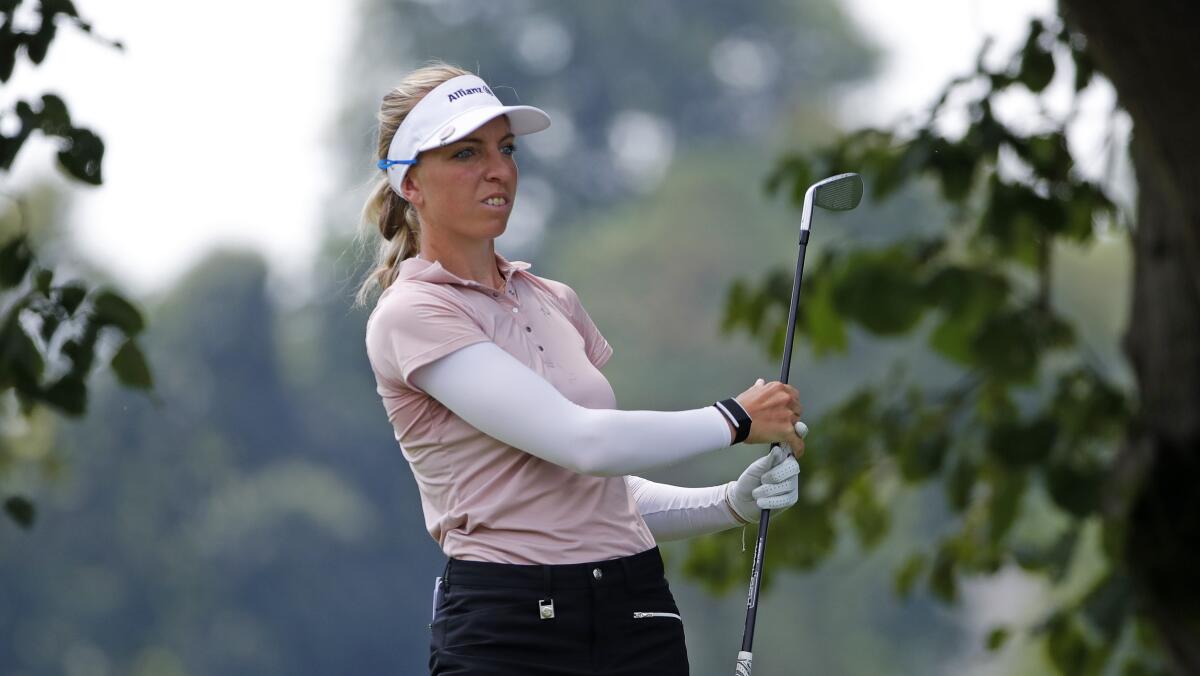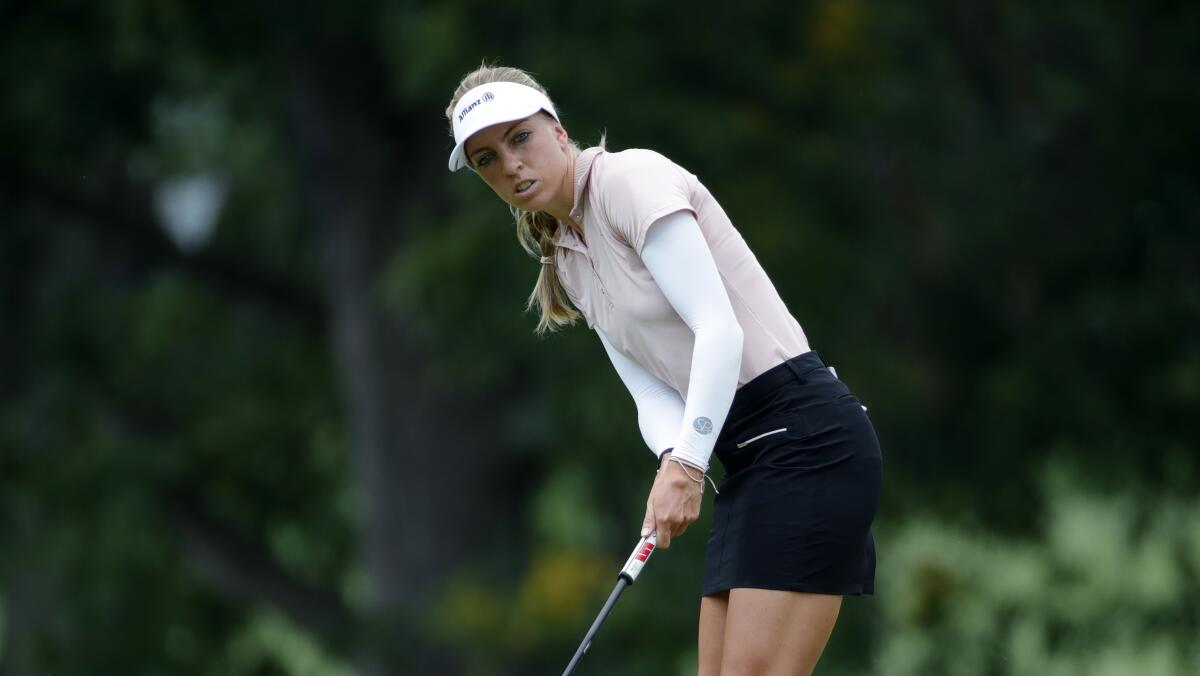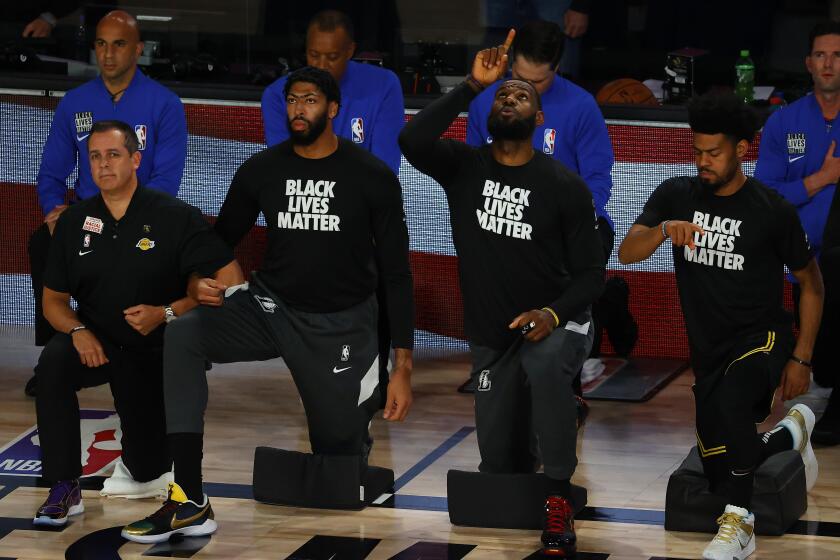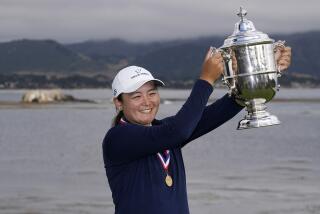Former USC star Sophia Popov still reveling in stunning British Open victory

- Share via
A single putt remained to stun the golf world. A few inches stood between Sophia Popov and perhaps the most improbable major victory in the history of the sport.
The former All-American from USC smiled as she strolled those final few feet of the 18th green at Royal Troon in Scotland last Sunday, the heavy weight of that realization sinking in further with each step.
Popov entered the Women’s British Open ranked 304th in the world. No woman in the sport’s history — and only one man, Ben Curtis in 2003 — had won a major championship while ranked outside the top 300.
She’d never won on the professional tour. If not for the pandemic, Popov probably wouldn’t have been invited to Scotland in the first place. Just a week earlier, she qualified for the Open with a top-10 finish at an event she’d played in only when higher-ranked players couldn’t because of COVID-19. The weekend before that, Popov caddied for a close friend on tour.
As she walked, years of emotion welled below the surface. The path to this unlikely putt had been long and arduous, lined with setback after setback, on and off the course.
Mookie Betts showed his leadership and the Dodgers displayed their unity by getting the biggest win of the season in the fight against racism.
Health issues sapped her strength and robbed her of three years on tour, before doctors finally found an answer. On the fringes of the top women’s tour, where paychecks were sparse, letdowns were numerous.
“She was always so, so close,” said Andrea Gaston, the Hall of Fame former Trojans coach who now coaches at Texas A&M. “I kept telling her it was going to come.”
When she missed her LPGA Tour card by a shot last season, Popov contemplated quitting golf.
Now, she stood a tap-in away from a two-stroke Open victory at seven under par, still convinced she was in a dream. Glimpses of the last six trying years flashed before her in overwhelming succession. Her head was swimming. Her heart was pounding.
“How exactly am I standing here?” Popov recalled thinking, when reached this week by phone in Germany, where she was raised. “I couldn’t piece it together. It couldn’t possibly be true.”
But as she marked her ball one final time, it hit her all at once. Everything she’d fought for was within reach. All the bad breaks had led her here to the brink of golf history.
Overcome with emotion, Popov, 27, pulled down the brim of her hat and began to cry.
::
The mysterious symptoms set in shortly after her professional career was set to take off.
At USC, Popov had already established herself as a towering talent, known for her fierce competitive streak. She earned All-American honors in each of her four years and helped the Trojans win a national title in 2013.
Justin Silverstein, an assistant coach on that team and USC’s current head women’s golf coach, calls her “one of the best players I’ve ever seen,” and by 2014, he wasn’t the only one taking notice. Soon, Popov signed with an array of sponsors, all eager to bet on her potential.
The pressure to perform had never been higher, when her rookie season began in 2015. But Popov had never felt worse. Her energy was unusually depleted. Her appetite disappeared. When she tried to eat, she couldn’t keep food down. Pounding headaches came and went. Her hands and feet sometimes went numb without explanation.
She lost 25 pounds. Her performance suffered. Rarely could Popov last through a round without some sort of setback, and travel on the tour made her symptoms worse. Her frustration over the uncertainty only compounded problems on the course.
“I had a feeling that I had to prove something, I guess,” she said.
The NBA playoffs resume Saturday, and the league and its players are increasing their efforts to fight racial injustice after the shooting of Jacob Blake.
She traveled to more than a dozen doctors, on both coasts and in Europe, in search of answers. None could pinpoint what was wrong. Her symptoms suggested a variety of illnesses, none of which proved to be the problem. Some doctors questioned whether they were in her head.
It took three years for Popov to finally receive a diagnosis. She still struggles to shake the feeling that those years were stolen from her.
“The frustration built up so much,” she said. “I couldn’t believe that no one could figure out what was wrong. I didn’t understand why it would take so long. By the time a doctor said, ‘Have you ever been checked for Lyme disease?’ I just didn’t understand why the previous 12 didn’t even consider Lyme disease. That was really hard for me.”
The effects and management of chronic Lyme disease vary from person to person, but for Popov, it took months after her diagnosis just to understand how to properly adjust. She experimented with her diet. She amped up her training. “It took a long time to find the right balance,” her mother Claudia said.

It took even longer for her to put lingering frustration with the situation behind her. She’d always been emotional on the golf course — prone, at times, to letting those emotions get the best of her. She tried to focus on moving forward, on rebuilding her confidence, but the sport seemed hell-bent on holding her back.
“The developmental life for female golfers is tough,” Silverstein said. “It wears on you.”
By the end of 2018, she missed one too many cuts to regain her LPGA Tour card for 2019. The next year, it was just one stroke that stood between her and a return to the tour.
“Those were two big blows in a row,” Popov said. She told her mom that she was considering quitting. She went so far as to research master’s programs at USC. But Claudia advised her to take two weeks away from the course to think about it.
Ultimately, she chose to stick it out. “I just couldn’t imagine letting the game get the better of me,” she said.
She vowed to make her return worth it.
::
When Popov arrived in Sylvania, Ohio, for the Marathon Classic this month, her expectations were low. She’d barely practiced the week before. Her invite was extended only after others declined because of COVID-19 restrictions. But she played well, finishing in a tie for ninth and earning her spot in the British Open.
She figured she had nothing to lose. She asked her boyfriend, Max, to step in as her “interim caddie.” They viewed it, Popov said, as “a bonus week” to spend together.
By Sunday, she held an improbable three-stroke lead, and the life-altering scope of what was at stake became starkly clear to everyone around her. A first-place purse of $675,000 was more than six times her career earnings. More importantly, it would secure her place on tour for the near future. Not to mention a place in the history of the sport.
The USC women’s golf team proved worthy if its No. 1 ranking when the coronavirus outbreak caused the season to be canceled.
But Popov remained uncharacteristically cool amid the mounting pressure. To keep her emotions in check, she and Max devised a game. After a shot, neither could offer any sort of reaction. Not even a disapproving sound. Max asked before Sunday’s final round whether she wanted to play, and Popov agreed.
It served her well. When she bogeyed the opening hole, after driving into a bunker and missing a 10-foot par putt, her coaches and family watched for signs of rising frustration. Instead, she responded with birdies on the second and third holes.
She wouldn’t see another bogey, in fact, until the 18th, when her penultimate putt pulled up just short. By then, however, her life had already changed. The difficult road leading to Royal Troon was firmly in the rear view. As the tears began to flow on No. 18, she collapsed onto Max’s shoulder, steeling herself for a moment, before tapping in her final putt.
She thought of how close she’d come to quitting. “Thank god I didn’t!” she would say at the winner’s presentation ceremony. As she held her trophy aloft, she looked at it with stunned disbelief.
Against all odds, she was a major champion, the first in Germany’s history for a woman. Whereas major winners usually get a five-year tour exemption, Popov’s is only through 2021 because she doesn’t have her LPGA Tour card.
Still, as she considers what comes next, she can barely believe it.
“I want to make sure that I keep reminding myself,” Popov said. “You’re still the Open champion, and no one can take that away from you.”
More to Read
Go beyond the scoreboard
Get the latest on L.A.'s teams in the daily Sports Report newsletter.
You may occasionally receive promotional content from the Los Angeles Times.









